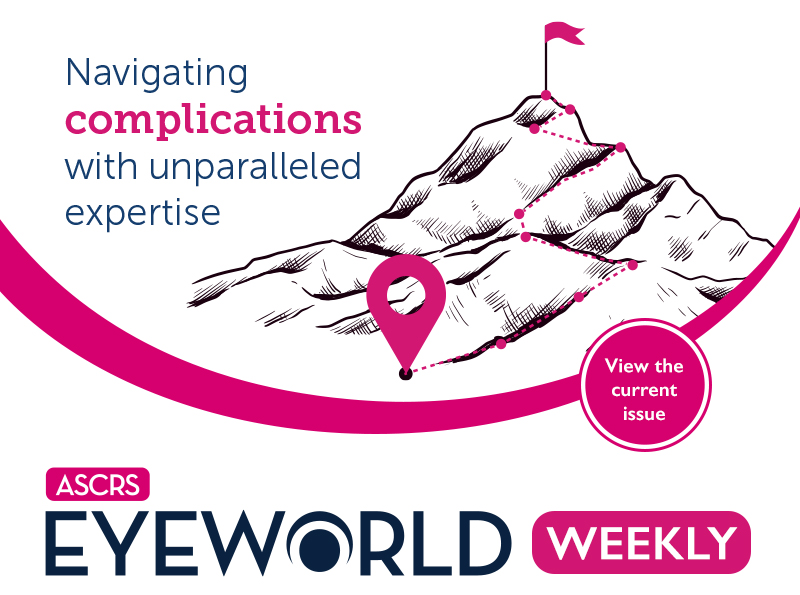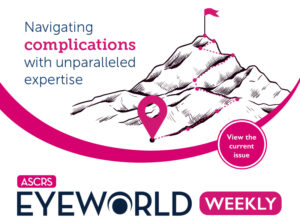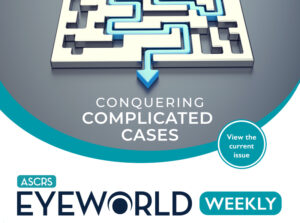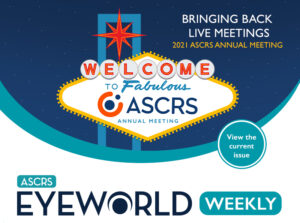
- FDA issues complete response letter for bevacizumab for retinal diseases
- First patient dosed in study evaluating X-linked retinoschisis
- Gene therapy study for Leber hereditary optic neuropathy begins dosing
- Update on rare retinal vasculitis events associated with GA treatment
- Eye drop recall grows
- ASCRS news and events
September 1, 2023 • Volume 29, Number 35
FDA issues complete response letter for bevacizumab for retinal diseases
Outlook Therapeutics announced that it received a complete response letter from the FDA for its biologics license application (BLA) for ONS-5010 (bevacizumab-vikg), in which the FDA declined approval of the company’s investigational ophthalmic formulation for treatment of wet AMD. According to the company’s press release, the FDA acknowledged that the pivotal trial met safety and efficacy endpoints but stated that it could not approve the BLA due to “several CMC issues, open observations from pre-approval manufacturing inspections, and a lack of substantial evidence.” The company’s president said in a statement that it will be requesting a meeting with the FDA to better understand this decision, how to resolve issues with the BLA, and next steps.
First patient dosed in study evaluating X-linked retinoschisis
Atsena Therapeutics has dosed the first patient in its Phase 1/2 trial of ATSN-201 for patients with X-linked retinoschisis (XLRS). According to the company’s press release, this investigational therapy is delivered intravitreally through capsids, avoiding some of the limitations associated with gene therapies that are delivered through AAVs. The Phase 1/2 study is an open-label, dose-escalation trial evaluating ATSN-201 in male patients with a diagnosis of XLRS caused by pathogenic or likely pathogenic mutations in RS1. There are currently no approved therapies for X-linked retinoschisis.
Gene therapy study for Leber hereditary optic neuropathy begins dosing
The first patient was dosed in Neurophth Therapeutics’ Phase 1/2 study evaluating a gene therapy for Leber hereditary optic neuropathy (LHON). The study, taking place in China and the U.S., is evaluating safety, tolerability, and efficacy of NFS-02 for patients with ND1 mutations. According to the company’s press release, NFS-02 is the only ND1-LHON treatment currently under investigation in the world.
Update on rare retinal vasculitis events associated with GA treatment
Apellis Pharmaceuticals has continued investigating rare retinal vasculitis events that have been associated with SYFOVRE (pegcetacoplan injection) for geographic atrophy (GA) secondary to AMD. According to the company’s press release, internal structural variations were identified in 19-gauge filter needles included with some injection kits. While the company stated that a causal relationship has not been established between these variation and retinal vasculitis events that have been reported, it is now recommending physicians use kits with 18-gauge filter needles, which are already in distribution. This recommendation, according to the press release, is out of an abundance of caution.
Eye drop recall grows
For months, the recall of several brands of artificial tears and other drop types over contamination fears has been making the news, with the CDC investigating dozens of cases of drug-resistant Pseudomonas aeruginosa linked to EzriCare Artificial Tears, for example. The latest eye drop recall from the FDA is for Dr. Berne’s MSM Drops 5% Solution and LightEyez MSM Eye Drops–Eye Repair due to concerns over bacterial and/or fungal contamination, though no adverse events have yet been reported. The FDA in a press release encouraged consumers to discard these products.
ASCRS news and events
- ASCRS Annual Meeting: The call for submissions for the 2024 ASCRS Annual Meeting is going on now through October 9. Find submission details here.
- ASCRS Leadership: ASCRS announced the new secretary for the 2024 Executive Committee, as well as some updates to clinical committee chair positions and awardees for the 2024 ASCRS Annual Meeting. Click here to read the announcement.
- ASCRS Grand Rounds: A new episode of ASCRS Grand Rounds, presented by the Hamilton Eye Institute, is available online now.
Research highlights
- A retrospective study involving 36 private practices in the U.S. evaluated the rate of adverse events for office-based lens surgery (cataract surgery, refractive lens exchange, or phakic IOL implantation). According to the study published in the Journal of Cataract & Refractive Surgery, 18,005 cases were included in the analysis. The rates of endophthalmitis, TASS, and corneal edema were 0.028%, 0.022%, and 0.027%, respectively. The authors reported that unplanned anterior vitrectomy was needed in 0.177% of cases, 0.067% of patients needed to return to the OR, and 0.011% were referred to a hospital. The authors concluded that “the rate of adverse events for office-based cataract or refractive lens surgery is similar to or less than the reported adverse event rate for modern cataract surgery in the ambulatory surgery center setting.”
- One-year secondary outcomes were described in the Tube Versus Trabeculectomy IRIS Registry Study compared to the Tube Versus Trabeculectomy randomized controlled trial. The IRIS-based retrospective cohort study published in the American Journal of Ophthalmology included 236 cases that received a tube and 183 that had a trabeculectomy; both groups had similar and significant IOP reductions from baseline to 1 year. When comparing the IRIS Registry Study to the randomized controlled trial, the authors reported that both trabeculectomy groups had similar IOP reductions and fewer medications at all time points, while there were “pronounced differences” in mean IOP reduction and medication use between the tube groups in these studies. The authors wrote that this latter difference was “presumably due to the inclusion of valved tubes” in the IRIS study.
Product news
- Sight Sciences introduced the Scion Surgical Instrument, which performs goniotomy with a bladeless tip.
- XDEMVY (lotilaner ophthalmic solution, Tarsus Pharmaceuticals) 0.25% for treatment of Demodex blepharitis is now available at pharmacies for prescription in the U.S.
- Johnson & Johnson Vision launched its new ELITA Femtosecond Laser System that is able to perform smooth incision lenticule keratomileusis (SILK) on patients with myopia with and without astigmatism.
This issue of EyeWorld Weekly was edited by Stacy Jablonski, Liz Hillman, and Ellen Stodola.
EyeWorld Weekly (ISSN 1089-0319), a digital publication of the American Society of Cataract and Refractive Surgery (ASCRS), is published every Friday, distributed by email, and posted live on Friday.
Medical Editors: Sumit “Sam” Garg, MD, Chief Medical Editor, Mitchell Weikert, MD, Cataract Editor, Karolinne Rocha, MD, PhD, Refractive Editor, Julie Schallhorn, MD, Cornea Editor, Manjool Shah, MD, Glaucoma Editor
For sponsorship opportunities or membership information, contact: ASCRS • 12587 Fair Lakes Circle • Suite 348 • Fairfax, VA 22033 • Phone: 703-591-2220 • Fax: 703-591-0614 • Email: ascrs@ascrs.org
Mention of products or services in EyeWorld Weekly does not constitute an endorsement by ASCRS.
Click here to view our Legal Notice.
Copyright 2023, EyeWorld News Service. All rights reserved.



